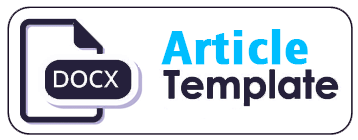Publication Ethics
Journal of Mechanical Engineering and Applied Technology (JMEAT) (e-ISSN : 3025-2725) is committed to upholding the highest standards of publication ethics and taking all possible measures against publication malpractice. All parties involved in the publishing process (editors, authors, reviewers, and publishers) must agree to the standards of ethical behavior described below. These guidelines are based on the Committee on Publication Ethics (COPE) Best Practice Guidelines.
Duties of Authors
- Originality and Plagiarism
Authors must ensure that their work is original and properly cited. Any form of plagiarism, including self-plagiarism or copying others' work without proper attribution, is unacceptable. - Data Accuracy
Authors must present accurate data and results. Fabrication, falsification, or manipulation of data is unethical and prohibited. - Multiple, Redundant, or Concurrent Publication
Authors must not submit the same manuscript to more than one journal simultaneously. Submitting the same research to multiple journals or publishing redundant articles is unethical. - Acknowledgment of Sources
Proper acknowledgment of the work of others must always be given. Authors should cite publications that have influenced their work. - Authorship of the Paper
Authorship should be limited to those who have made a significant contribution to the conception, design, execution, or interpretation of the study. All co-authors must approve the final version of the manuscript. - Disclosure of Conflicts of Interest
All authors must disclose any financial or other substantive conflict of interest that might influence the results or interpretation of their manuscript. - Reporting Errors
When an author discovers a significant error or inaccuracy in their published work, they are obliged to promptly notify the journal editor and cooperate in retracting or correcting the paper.
Duties of Editors
- Fair Play
Editors evaluate manuscripts based on their intellectual content without regard to race, gender, sexual orientation, religious belief, ethnic origin, citizenship, or political philosophy of the authors. - Confidentiality
Editors and editorial staff must not disclose any information about a submitted manuscript to anyone other than the corresponding author, reviewers, and other editorial staff. - Disclosure and Conflicts of Interest
Editors must not use unpublished materials disclosed in a submitted manuscript for their own research without the author's written consent. - Publication Decisions
Editors are responsible for deciding which submitted manuscripts should be published, based on the work’s importance, originality, clarity, and relevance. - Handling Unethical Behavior
The editorial team will take responsive measures when ethical complaints have been presented concerning a submitted manuscript or published paper.
Duties of Reviewers
- Confidentiality
Reviewers must keep all information regarding manuscripts confidential and treat them as privileged information. - Objectivity Standards
Reviews should be conducted objectively and express their views clearly with supporting arguments. - Acknowledgment of Sources
Reviewers should identify relevant published work that has not been cited by the authors and notify the editor of any substantial similarity between the manuscript under review and any other published paper. - Conflict of Interest
Reviewers should not review manuscripts in which they have conflicts of interest resulting from competitive, collaborative, or other relationships with any of the authors.
Publisher's Responsibilities
The publisher of JMEAT ensures that good practice is maintained in the publishing process. It takes all necessary actions to identify and prevent the publication of papers where research misconduct has occurred, and will retract or correct articles when necessary.





